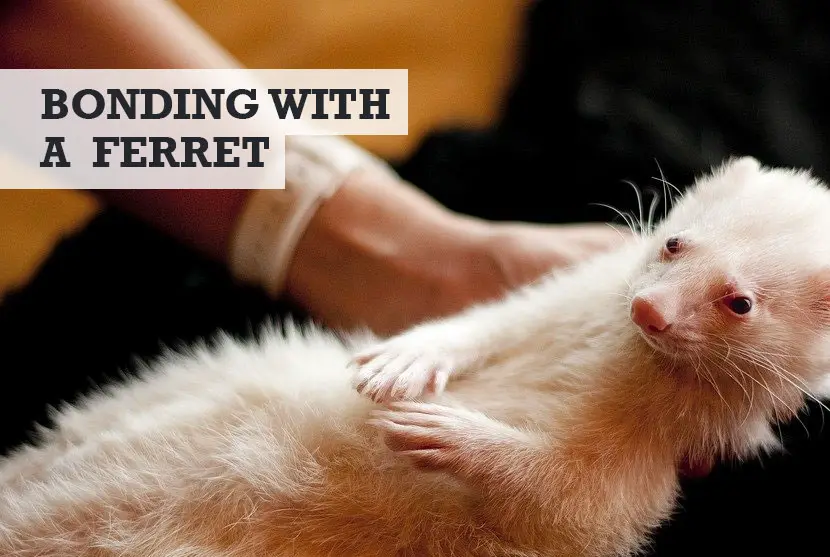Owning a new ferret comes with plenty of challenges, so you’re going to be kept very busy. What people don’t often talk about though is the heartache of having a ferret who won’t bond with you, no matter how much you try.
I completely understand this, so… I’ve developed this guide which explains how to bond with a new ferret. Follow the tips and you can build a bond with your ferret for years to come, very similar to how you might with a pet dog.

How to bond with a ferret
Aside from giving your new pet the care and attention, food, and warmth he needs, there are other things you can do to bond with your ferret.
Also make sure you watch the video a little down which shows real life examples of how ferrets bond with humans.
1. Let the ferret smell you
Before picking up your new ferret, it’s best to let them smell your hand first. Make sure you don’t startle them or make sudden movements that will scare them.
This simple action should be repeated over the course of a few weeks so the new ferret starts to trust you. It’s the first step you can take in building a strong bond with your ferret for life.
2. Be gentle when picking your ferret up
Pick up the ferret gently but firmly enough to support their weight. If possible, avoid surprising your fuzzy buddy, as this can cause harmful and potentially deadly stress in your pet.
Be mindful of their claws, as they may try to escape.
3. Bond with a ferret by using a soft voice
Make sure to talk to the ferret in a cutesy and soft calming voice. This can be done while you hold them, but not so close to their ears that it becomes uncomfortable for them.
Don’t startle or scare your fuzzy friend with any loud noises.
4. Let the ferret explore you at his own pace
Sit down somewhere comfortably and let the ferret roam on your body. It is a good time for bonding while exploring you. Just be patient and let ferret come to you.
Ferrets are natural explorers, so there’s no need to rush anything.
5. Never chase your ferret
During the bonding process it might be tempting to chase the ferret if he runs off. But don’t do this, it will cause more harm than good… unless of course he’s escaped outdoors!
Your ferret will find the chase very intimidating, and it will set your relationship back weeks. Ferrets will get very annoyed if you chase it. It will allow you to build a stronger bond with the ferret as they get more used to you.
6. Be careful when handling the ferret
Don’t ever pick up your ferret by its tail or scruff. These areas are very fragile and will cause severe stress on the ferret.
A stressed and scared ferret will not want to bond with a human.
7. Let them sleep in your sight
Let the ferret sleep with you in your room at night, so they get used to where you are sleeping. That can be beneficial for you both, as it sets boundaries between you and the ferret.
It will also create a bond between you and the ferret. Many people have compared this to getting new puppy, and having them in the bedroom at night in their crate.
8. Give the ferret a routine
Place their food and litterbox beside your bed, so they get used to where everything is. You can also start the potty training now too.
If it’s possible, place their bed next to yours as well. Ferrets are very sociable creatures that love sleeping with their owners. They will feel right at home if they’re near you, which can also help them get used to your scent.
When ferrets sleep near their owners, they are likely going to build a better bond with their favorite human.
9. Don’t try and force the ferret to bond with you
Don’t force the ferret to do anything it doesn’t want to. If they don’t want to cuddle and bond with you, let them be. Just pick up and hold your ferret for a while to get used to your scent and presence before putting them down gently.

10. Give the ferret lots of attention
Give them plenty of attention once you finally start playing with each other. This can be through using a toy or just scratching their backs.
Ferrets love being scratched behind the ears and will start rolling around because of it. It can be hard to get them off you once they get going!
11. Take your time and be patient
Give your ferret plenty of time to cuddle with you before picking them up. They may want to stay on your lap or body for hours, but that’s up to them. Be patient and give the ferret plenty of time to adjust before picking it up.
12. Give your ferret lots of love
Ferrets need lots of love, so be sure to get them used to your hugs and kisses by placing their paws on your lips while kissing them. They will enjoy this eventually but may take some time to get used to it.
Once they get used to it, they will start to bond with you and will see this as part of the bonding process.
13. Give your ferret some freedom
Let your ferret out of its cage for longer periods so it can roam around the house. Be mindful of where you put dangerous items like electrical wires or pens, as ferrets are naturally curious animals who want to explore their surroundings.
Handy Hint: Here’s a recommendation for how big your ferret’s cage should be any why.
14. Offer your ferret the protection he needs
Always watch the ferret while it explores. It is usually very easy to lose track of them when they’re in another room, but ensure you know where they are and what they’re always doing.
15. Get your ferret accustomed to noise
Spend time getting your ferret used to the noise of your home appliances. You don’t want your fuzzy friend running or hiding whenever your vacuum cleaner turns on or is startled by loud noises.
16. Give your ferret the luxuries he needs
If you can, try giving your ferret a space of its own in your room. Having the ferret sleep near you can be beneficial, but this will require some thinking ahead. You don’t want your ferret sleeping somewhere that isn’t safe, like on top of a dresser or wardrobe.
If the ferret isn’t comfortable getting onto your bed yet, allow them access to it while it’s still made up.
The sheets should be clean, and the pillowcases should be mostly empty of your scent, which can make the ferret feel uncomfortable.
If necessary, rub a small amount of ferret shampoo on your sheets before placing the ferret down. This will make sure the scent is like what it’s used to, which can encourage it to sleep in its bed without any fuss.
Handy Hint: Baby ferrets tend to be very hyper. Here’s how you can calm them down in 9 simple steps.
17. Let your ferret on your bed
Once the ferret is used to being around you at all hours of the day, one last step remains: allowing it to sleep in your bed. This should complete the bonding process between the two of you.

But before having them sleep with you every night, be sure they’re willing by placing them on your bed and gently petting it until they feel comfortable and start crawling around.
Building a relationship with your ferret
Now you know how to bond with your ferret, please take the time to understand a few more things which might help your relationship.
How long does it take to bond with a ferret?
The ferret’s personality will come into play here of course, but most people reported that it took them 6 to 8 weeks until they felt like they had bonded with their ferret.
If you put the effort in, you might bond with your ferret quicker.
What defines bonding with a ferret is very much down to the owner’s individual interpretation.
Do ferrets bond to one person?
Ferrets will tend to bond with the one person who gives them the most care and attention. So, if that’s just one person, then yes, the ferret will bond to that singular human.
However, if you share ownership and responsibilities, you might see your ferret bonding with the whole family.
Can you snuggle with a ferret?
You can cuddle and snuggle with a ferret, but they might be wriggly until you have fully bonded with them.
If they do struggle, let them escape, and don’t grip them hard it could hurt them.
How to tell if your ferret doesn’t like you?
An unhappy ferret who doesn’t like you will make it very clear. The types of body language and behavior to watch for when ferrets don’t like you include:
- Will hiss and shriek at you (hear the sounds).
- Will run around the room looking confused.
- Will cower and back away from you.
- Will hide when you come in the room.
- Will refuse to play.
- Will refuse to eat.
Conclusion
The bond you share with your first ferret is a precious one.
With time, patience, understanding, and kindness, you can build a bond with a ferret that will be similar to what you might expect from a dog or cat.
You might also like…
Image in header via https://pixabay.com/photos/ferret-animal-pet-domestic-1215159/

